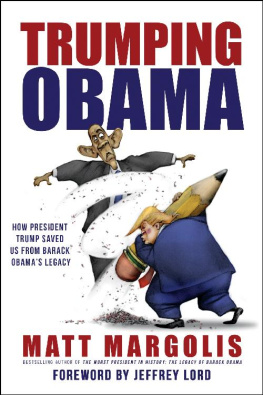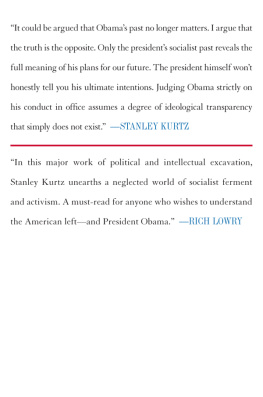Acknowledgments
The process of analyzing President Obama was both exciting and challenging. And while his evolution continues, recording my analytic findings had to eventually coalesce in printdespite being in medias res. None of that coming together would have been possible without a great deal of help and support from many people.
First and foremost I owe my gratitude to the subject of this studya man I never met personallyPresident Barack Obama. His openness, his consistently thoughtful approach to the toughest of jobs, and his brilliant and moving memoir made my own work that much richer. In Dreams from My Father he delved deeply into his own history and feelings with candor one rarely sees outside the consulting room, making my work more collaborative than I ever anticipated.
There are agents and agents, and then there is Gail Ross. Her intelligence and enthusiasm made this book possible. I hope I can justify her generous help. I remain grateful to her colleague Anna Sproul, and to Howard Yoon, who carefully put the proposal together.
My smart and steady editors at Free Pressmy astute and effervescent senior editor Dominick Anfuso, and the hardworking Maura OBrien and thoughtfully meticulous Edith Lewis, who made the book clearer and smarter than I ever could alone.
Research was not easy to come byat least, good research. Gavrie Kullman introduced me to Sarah Berns, who carried the ball for months, not just by finding requested materials but also by sending me the occasional article she rightly thought would be of interest. Jana Nelhybel organized many divergent ideas so the project could get off the ground. And at my home office I depended on the help and energy of Bea Tolson and Patrice Brown.
Im grateful for the help and support of many friends: Steve and Karen Scheinman, Marty and Mary Stein, Lou Borgenicht and Jodi Plant, Steve Weissman, Dan Auerbach, John and Kaye Spilker, Steve Sharfstein, Marilyn Black, Jerry Zupnick, Fred Meisel, Mike and Elizabeth Marcus, Linda and Gerald Stern, Ray and Shauna Wertheim, Spencer Graham and Elizabeth Pressler, Nechy and Tito Pieczanski, Sam Goodman, Jeff and Michele Steinberg, and the two BobsKaplan and Kingall friends for at least forty years, many for more than sixty. Thanks also to skiing and fressing friends Richard Miller and Marty Gold. Yaz Boyum tried hard to keep me healthy, while Carlos Campbell kept the beat going in many ways. Sandy Dijkstrashe of the original on the couch ideawas positive from the beginning.
Alitta Kullman kept tabs on my progress while offering analytic insights as well; her husband, Uri, presciently recommended that I read Shelby Steeles book on why Obama couldnt win in 2008. Thanks to Jay the Bump Schlossberg and Eileen the Skeptic Brengle, and the younger set Jenni and Jacob Romanek who were always there in spirit and enthusiasmalong with Mike Decker, Jason Kohn, David Segal, Eric Stern, and Julie Kennedy. Ive been lucky to have had so many interesting discussions over the past year. The late Keith Byers often wrote to me on the complexity of political life today; I will miss his sardonic perspective.
Sabrina Cassagnol never stopped giving off her own brand of uniquely positive energy, while the lively Ben Schottapparently surrounded by a family of neurologistssuggested I look at Antons syndrome, as it were. Gianna Polacco Williams, Jesse Kornbluth, and Karen Collins kept me from being blinded by my own political frustrations with President Obama. Paul Steinberg encouraged me to look at Jung and Rilke for inspiration. Hannah and Jeff Fox kept asking when they could read the final version, all the while offering trenchant political and psychological insights. Jessica Benjamin is not only smart; she never gives up and insists on thinking clearly about the unclear. Rob Pobi, the thrilling thriller writer, kept encouraging me by telling me to keep my behind glued to the chair. It worked, Rob.
Many friends were kind enough to read and comment on the entire manuscript at various stages in its evolution. My son Abe became my mentor. He was the first person who told me about Obama in January 2002, he helped me clarify my ideas with thoughtful and tough questions, and along with Joe Scott he suggested that I include a glossary of psychoanalytic terms. I thank psychoanalyst Fred Meisel, who said Obama finally made sense, and Gerald Stern, who read while listening to Ode to Joy. I thank Dr. Anton Obholzer of Londons Tavistock Clinic, who affirmed my particular psychoanalytic approach. Pamela Brewer, psychotherapist and incisive radio host of MyndTalk, expanded my thinking about the emotional issues confronting biracial people; Mark Dawes pushed me harder to think about who I thought Obama actually was; Michael Carmichael was generous with both his time and support; Andrea Schultz read the manuscript twicebefore and after editsdespite her extremely busy life, and gave me confidence for which Ill always be grateful; Harvey Saferstein read and marked up the manuscript like it was a legal brief; Tony Perram read critically, offering useful suggestions and astute criticism that I took to heart. Connie Kagels reading both encouraged and inspired. I thank you all.
Nancy Miller and Walter Romanek read with an unflagging enthusiasm that accompanied their astute observations, some of which they will recognize in the book. They deserve their own paragraph.
My book group generously granted me leave, and I thank them all: Don Bandler, Chuck Gustafson, Carole Mason, Walter Romanek (encore), Lois Schiffer, Liz Shriver, Ray Szcudlow, and Tara Wallace. Their support was palpable.
Others who contributed their ideas and support include Michele Kearney, Helen OLone, Mitch Liftin, Rosemary McHugh, Susan Samuels, Dr. Jim Herzog (of Father Hunger fame), Drs. Qanta Ahmed and Scott Kahan, Sunny Goldberg, Ray McGovern, and cousins Dr. Teddy Rothschild and Nancy Rosenberg. I thank you all.
Culinary support and encouragement came from people who made this process more digestible than ever. Among the support, none tasted as good as from the gang at BlackSaltthe best restaurant in Washingtonwhere the food is as good as the ambience. Special thanks to Rick Cook, the redheaded genius behind the stove; Susan Wallace, who spins sugar finer than any mythic figure; not to mention MJ and Sergio, who kept me in fish exotic or local; and Abdul, Katie, Emilia, Beth, Sarah, and many more. Then there was the stellar staff at the Ritz-Carlton Cancn, who fed me a special Mayan diet, while concierges took care to make sure the writing conditions were sublime. No culinary support would be complete without the tasty charcuterie and bonhomie of Jamie Stachowski at the Palisades Sunday Market.
My three seminars, composed entirely of talented senior therapists, all helped clarify my clinical thinking while at the same time putting up with my particular analytic approach to the work. Thanks to Janet Black, Allen Du Mont, Janet Finell, Cary Gallaudet, Connie Kagel, Gloria Oviedo, Patricia Slatt, Sharon Alperowitz, Linda Dickson, Jaedene Levy, Micki Penn, Fran Rosenfeld, Linda Schwartz, Denise Shauer, Judy Brandzel, Connie Donaldson, Andrea Feldman; Ann Curtain Knight; Bev Gold, Charlene Goldblatt, Eileen Hunter, Susan Medoff, Margery Rosen, Ellen Rosenzweig, Barbara Shapiro, Kathy Sinclair, and the late smart and sweet Ruth Rapaport.
Of all the people responsible for my learning and growth over the years, however, my greatest thanks goes to my patients past and present. Without them there would be no understanding.
The Perram clan remained positive through it all. Thank you Tony and Shirley and your great daughters Nol, Carolyn, and Elise. And Dave Monahan is a champ. Rich (you know who you are) also kept things in focus.
This book would not have been possible without the hard work of Tom Spain. Not only is he brilliant and extremely organized, but his deep understanding of this project made it flow and grow. He continues to function like my alter ego. Micheline Klagsbrun generously gave her thoughtful support, wanting to be sure I wouldnt be too hard on our president. Ready help was available from my perspicacious sister Ellen and her steadfast husband Steve Dickman. My children Joey, Abe, and Ginevra each and all gave encouragement laced with thoughtful criticismasking me questions that put me on the spot and pushed me to think more clearlysomething they have done since birth. Ginevra not only asked probing questions that challenged my arguments, she also gently helped me keep my nose to the grindstone. Joey offered idiosyncratic approaches to Obama that sharpened my thinking. And Abe carefully read and critiqued the manuscript in its several iterations; the only thing that exceeds my gratitude is my pride in his unique talentstalents that are enhanced by his warm heart. The significant others also were thereMaria, Emily, and Vinnyand I thank you all.




